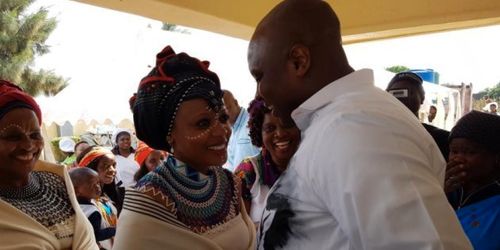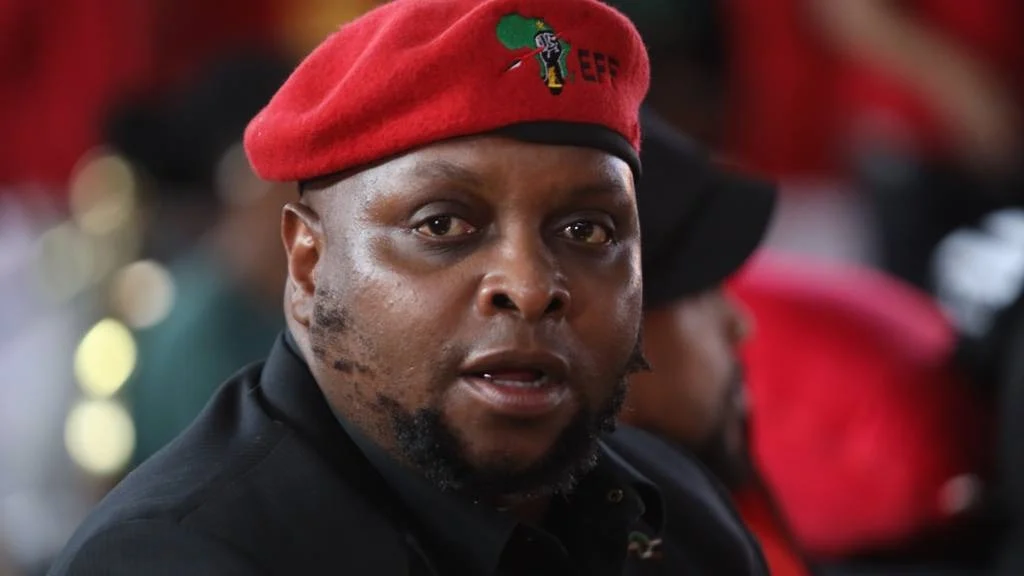Quick Facts
| Fact | Detail |
|---|---|
| Full Name | Nyiko Floyd Shivambu |
| Date of Birth | January 1, 1983 ([age]19830101[/age] years) |
| Place of Birth | Malamulele, Limpopo, South Africa |
| Current Position | Deputy President of the Economic Freedom Fighters (EFF) |
| Education | Bachelor’s Degree, Honours Degree, Master’s Degree (Political Studies) |
| Alma Mater | University of the Witwatersrand |
| Political Affiliations | African National Congress (1990–2012), EFF (2013–present) |
| Parents | Elias Shivambu, Constance Shivambu |
| Spouse | Siphesihle Pezi-Shivambu (Married in 2017) |
| Notable Roles | EFF Chief Whip in Parliament, Member of Pan-African Parliament |
| Published Work | Co-editor of “The Coming Revolution: Julius Malema and the Fight for Economic Freedom” |
| Resignation | Resigned as EFF Deputy President on August 14, 2024 |
| Future Plans | Joining Jacob Zuma’s MK Party |
Biography of Floyd Shivambu
Nyiko Floyd Shivambu, born on January 1, 1983, in Malamulele, Northern Transvaal (now Limpopo), is a prominent South African politician known for his role as the Deputy President of the Economic Freedom Fighters (EFF). His journey from humble beginnings in Limpopo to a key figure in South African politics reflects his determination and leadership abilities.
Early Life and Education
Floyd Shivambu was born in the rural village of Mahonisi in Malamulele, Limpopo. Raised in a modest household without running water or electricity, Shivambu experienced the challenges of rural life firsthand. Despite these difficulties, he excelled academically, graduating from Mphambo High School in 2001. His academic journey led him to the University of the Witwatersrand in Johannesburg, where he initially pursued a career in technology before shifting his focus to political studies.
At Wits, Shivambu earned a Bachelor’s degree and an Honours degree in Political Studies and International Relations. He further distinguished himself by obtaining a Master’s degree in Political Studies with distinction in 2004. During his time at the university, Shivambu became actively involved in student politics, serving as president of the Student Representative Council (SRC) and joining the African National Congress Youth League (ANCYL).
Political Career
Shivambu’s political career gained momentum with his involvement in the ANC Youth League, where he served as the league’s spokesperson. His tenure with the ANC ended in 2012 when he, along with Julius Malema, was expelled from the party. This pivotal moment led to the founding of the Economic Freedom Fighters (EFF) in 2013, where Shivambu became the Deputy President.
As a member of parliament for the EFF, Shivambu has been a vocal advocate for economic justice, land reform, and nationalization. He has played significant roles in various parliamentary committees, including the Standing Committee on Finance and the Trade and Industry Portfolio Committee. Shivambu also served as a member of the Pan-African Parliament from 2014 to 2018, where he contributed to discussions on rural economy, agriculture, and natural resources.
Personal Life
In 2017, Floyd Shivambu married Siphesihle Pezi-Shivambu. Their marriage has been a significant part of his personal life, offering him support as he navigates the complexities of South African politics.

Publications and Resignation
In 2014, Shivambu co-edited a book titled “The Coming Revolution: Julius Malema and the Fight for Economic Freedom,” which provides insights into the EFF’s vision and Malema’s influence in South African politics.
On August 14, 2024, Shivambu announced his resignation as the EFF’s Deputy President, marking the end of a significant chapter in his political career. Following his resignation, he revealed his intention to join Jacob Zuma’s MK Party, signaling a new direction in his political journey.
Legacy
Floyd Shivambu’s contributions to South African politics, especially through his work with the EFF, have made him a prominent figure in the country’s ongoing struggle for economic justice and social equality. As he embarks on the next phase of his career, his influence and leadership will likely continue to shape South Africa’s political landscape.
